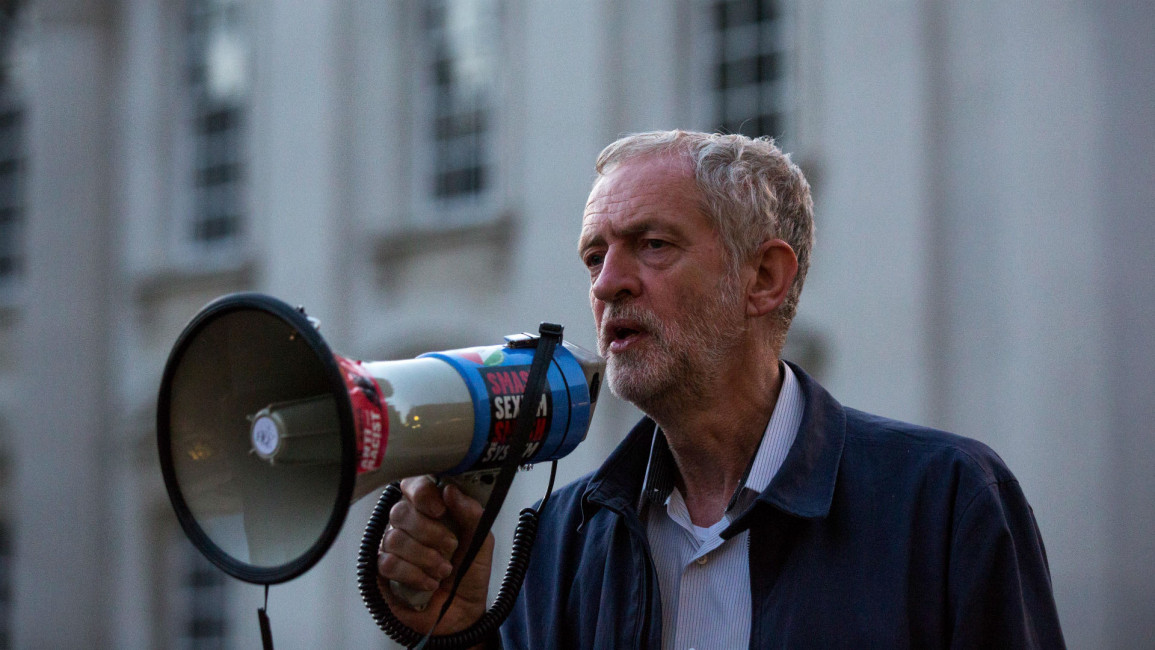
Scots and Corbyn challenge UK foreign policy
In 2015 electoral shocks and unmanageable regional events shaped the UK's political conversation and policies when it came to the Middle East. The significance of these developments will carry over into 2016, and the Middle East will continue to be a major factor in party politics.
In the May general election, the surprise victory of the Conservatives unshackled the party from its coalition with the Liberal Democrats, allowing the Tories to pursue their Middle East agenda unimpeded.
The sweeping aside of Ed Miliband's Labour Party by the Conservatives in England was more than matched by the Scottish National Party, which destroyed Labour in Scotland, winning 56 out of 59 seats. The SNP became the third largest party in Westminster and have provided more of an opposition to government Middle East policy than a Miliband-led Labour would ever have.
Alex Salmond returned to Westminster as the SNP's Foreign Affairs Spokesman. He remains a formidable opponent for any government to face, with a track record of outspoken criticism of the UK's Middle East policy, including vehement opposition to the invasion of Iraq.
Unlike other parties, the SNP is unencumbered by the presence of a strong Israel lobby within its ranks.
Labour shock
Miliband's resignation as Labour leader initially failed to generate much excitement, with MPs throwing their hats in to replace him from centre to centre-right, and with a consensus that Labour hadn't been sufficiently right-wing enough to win the election.
The continuation of a virtual Conservative-Labour cartel over Middle East policy loomed.
| Read more: [Analysis] Jubilant Scots and 'shy Tories' shift Britain's political landscape |
But the third electoral shock of 2015 followed as Jeremy Corbyn, a hero of the peace movement, secured a stunning victory in the Labour leadership contest. Corbyn gained the biggest democratic mandate in British party political history. Like Salmond, Corbyn has repeatedly been proved right on the Middle East.
The immediate response of Prime Minister David Cameron was to brand Labour under Corbyn "a threat to our national security" - an approach that he has maintained, most recently labelling those opposed to war in Syria "terrorist sympathisers".
On the one hand, Corbyn is an easy target for the Conservatives, an anti-war campaigner who can be attacked as soft. The Labour leader even faced criticism for saying he would not be willing to attack another country with nuclear weapons.
On the flip side, Corbyn is capable of embarrassing the government with his principled and nuanced take on Middle East affairs. He showed this recently with his challenge to Cameron over UK airstrikes in Syria.
| Read more: [Analysis] Cameron faces anti-bombing Syria rebellion amid 'terrorist sympathisers' debacle' |
Serious challenge
Between Corbyn and the SNP, the Conservatives face a much more serious challenge to the status quo than they ever faced from Ed Miliband.
Corbyn, though, must contend with dissent from within his own party, and it is likely that members of his shadow cabinet will continue to seek to undermine his authority as they look to replace him with a more centrist figure.
For Middle East policy, this means that Corbyn has to win over party rebels if he is prevent Labour remaining a party of perpetual war, dictatorships, absolute monarchies and human rights abuses.
Palestine could unify the SNP and Corbyn's Labour against Cameron in 2016. Syria never really looked like the issue upon which Corbyn could assert his authority, but with Labour already having backed Palestinian statehood in 2014, the new leader can assert some real pressure on the government to make tangible progress on ending the occupation and the siege of Gaza.
Events in the region also challenged orthodox thinking in 2015.
The huge flow of refugees in to Europe, including from Iraq, Syria and Libya brought the consequences of the UK's military campaigns close to home. The austere response from the Cameron government to the refugee crisis stood in in stark contrast to the humane response of the public.
Corbyn and the SNP easily captured the moral high ground, while the Tories appear to have gambled on riding out the damage to their reputation.
 |
The Conservative government will resolutely pursue its agenda |  |
The continued growth of the Islamic State group was the other major regional development of the year, with its macabre propaganda a source of frequent headlines for the bloodthirsty British media.
Having been forged in the crucible of the US and UK-led invasion of Iraq, the current state of affairs, with IS controlling fluctuating amounts of land of approximately the same area as the UK, demands a review of British Middle East policy.
Conservative agenda
The Conservative government will resolutely pursue its agenda, which includes strengthening ties with Saudi Arabia, Israel, the UAE and the military regime in Egypt.
Overthrowing both Assad and IS in Syria are major goals. Much Tory foreign policy is based on attracting investment to the UK, and securing contracts for UK firms in the Middle East, whatever the human cost.
Starting with a harrowing winter refugee crisis, many will point to the dire humanitarian situation as a manifestation of the government's complacency. Disaffection will only increase if there are terrorist attacks in the UK, or further civilian deaths from British airstrikes in Raqqa.
The government's approach to the region is crying out for an effective opposition.
Jeremy Corbyn will need to use all of his diplomatic skill and moral authority to manoeuvre his party behind him. If he manages this, Labour could form a potent double act with a Scottish Nationalist contingent eager to prove that they represent something fresh in parliament.
The Middle East will keep throwing up opportunities for opposition parties. If they take advantage in 2016, they could shape UK Middle East policy for years to come.
Tom Charles is a London-based writer, editor and literary agent. He previously worked in the UK parliament, including as a lobbyist for Palestinian rights. He has contributed to Jadaliyya and the Journal of Palestinian Refugee Studies. Follow him on Twitter: @tomhcharles
Opinions expressed in this article remain those of the author and do not necessarily represent those of The New Arab, its editorial board or staff.




